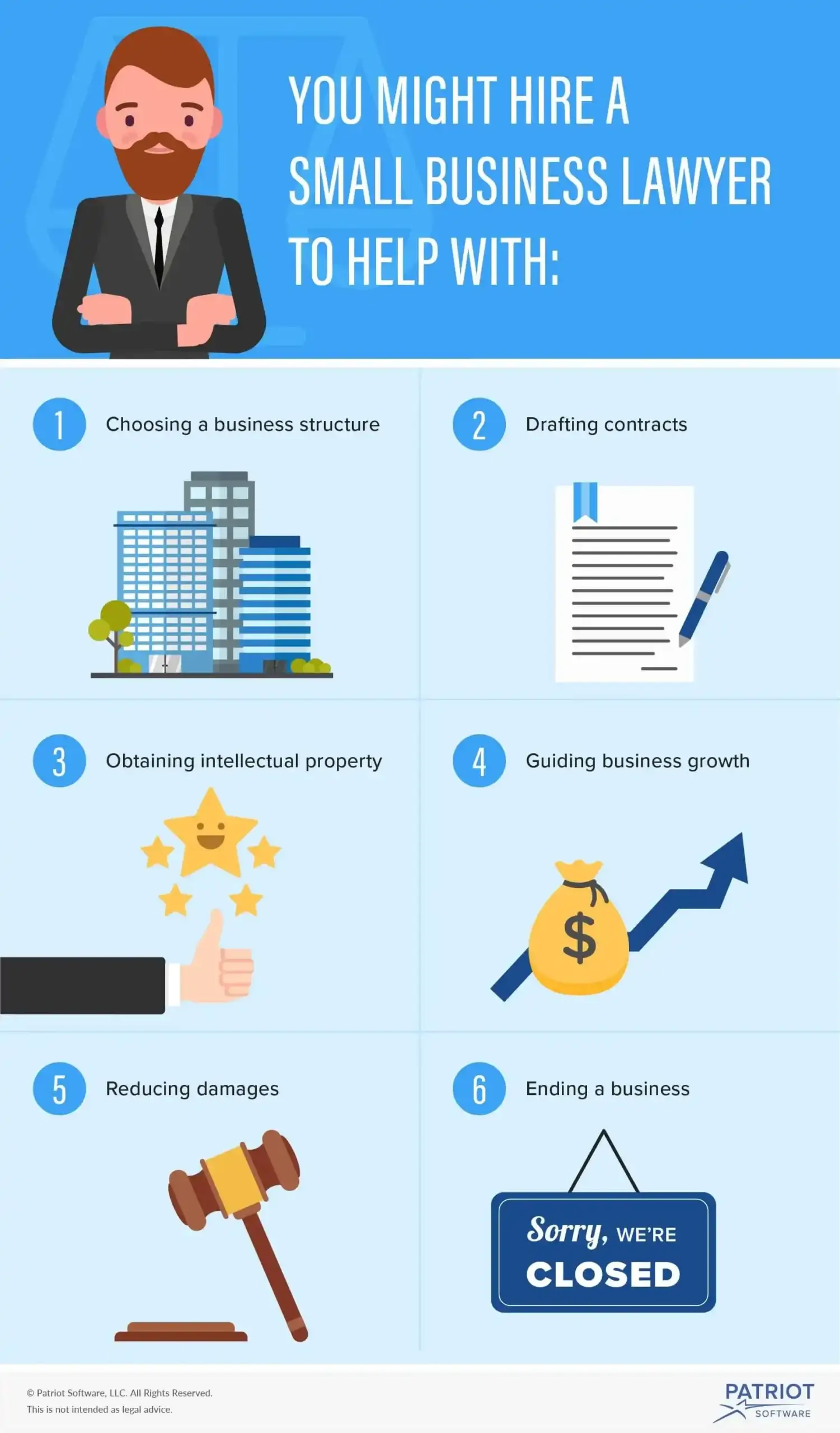You can manage many business owner responsibilities on your own, such as handling day-to-day operations and making financial decisions. But sometimes, you need outside help, such as guidance from a small business lawyer.
A business attorney can do much more than help companies file for small business bankruptcy. Whether you’re seeking their advice to grow your business or you need help out of a difficult situation, there are a number of reasons you might consider hiring a small business attorney.
When might you hire a small business lawyer?
Hiring a small business lawyer generally isn’t like hiring a permanent employee for your company. But if you are considering hiring a lawyer, you still need to do your research. Find a lawyer who specializes in small business.
Although you probably don’t need a lawyer to help you make every business decision, there are a few reasons why lawyers for small business owners are necessary.
Here are six instances when hiring a small business lawyer might be the right move for your business.

1. Choosing a business structure
Deciding your business entity is a big decision. How your business is structured impacts your business liability and tax obligations. The type of structure you choose also depends on how many owners the company will have.
There are four main business structures you can choose between:
- Sole proprietorship
- Partnership
- Corporation
- LLC
Sole proprietorships are owned by one person. Sole proprietors are entitled to all the business’s income and pay taxes at the personal level. If you structure as a sole proprietorship, you and your business are not considered separate entities. Although this is the easiest way to structure a small business, sole proprietors are liable for the business’s losses.
Partnerships are owned by two or more people. Like sole proprietorships, partnerships are only taxed at the personal level. You can structure as a general or limited partnership. In a general partnership, all partners are liable for the business’s liabilities. And, all partners generally have equal shares in profits. In a limited partnership, one partner is a general partner who is liable for all liabilities while the other partners are only liable for their investments. Limited partners do not have rights to business decisions.
Corporations separate the business from the owner. This means you pay taxes at the personal and business level. But it also means you are not personally liable for business losses. To form a corporation, you must incorporate by filing articles of incorporation. After incorporating, you become structured as a C corporation. You can also decide to form an S Corp by filing an additional form (Form 2553). Like a C Corp, an S Corp provides limited liability. But, there is no double-tax under an S Corp.
Lastly, a limited liability company (LLC) combines the limited liability of a corporation with the tax benefits of a partnership. You can either form a single-member or multi-member LLC. And, forming an LLC is generally easier to do than forming a corporation.
A lawyer for business startup can help you determine which structure will work best for your business. And, a lawyer can help you with tasks like filing articles of incorporation and obtaining the appropriate licenses and permits.
2. Drafting contracts
There are a variety of contracts you might need to use in your small business, such as a confidentiality agreement or service agreement.
A confidentiality agreement, or non-disclosure agreement, prevents your employees from sharing sensitive information about your business. You might also consider having employees sign non-compete agreements. These prevent employees from working for or starting competitor businesses.
Service agreements are contracts between businesses and the customers they are providing services to. If you are a service-based business, you should have a service agreement in place so your customers know what services you are providing and how much they owe you. And, these contracts protect your business and ensure you are paid.
You probably don’t know what language to use when drafting contracts. And, you need to make sure that the binding contract is worded correctly. After all, you don’t want your contract to land you in hot water.
Hiring a lawyer is also a good idea if another party asks you to sign a contract. You must fully understand the contract’s terms and conditions so you don’t jeopardize your business. For example, you might be required to sign a loan agreement with a bank.
3. Obtaining intellectual property
You might also want to hire a lawyer to protect your business. Setting up patents, trademarks, and copyrights can ensure others don’t steal your business ideas.
Lawyers can be great resources when applying for patents, trademarks, or copyrights. The lawyer can help you decide which type of intellectual properties you need. And, they can help you through the registration processes.
For example, the application process for patents is especially rigorous. A lawyer can help direct you to use the right language on your application.
4. Guiding business growth
Sometimes, you need guidance when growing your business.
Small business lawyers can guide you in seeking additional small business financing. Much like an accountant, they can review your business’s profits and losses with you and suggest next steps for obtaining new loans or investments. And, your business lawyer might be able to refer you to angel investors or venture capitalists.
You can hire a lawyer to help you acquire a small business or product. Before acquiring the business or product, you must do your business due diligence. Your lawyer can investigate the business or product you are interested in to make sure that it is worth it. And, they can assess the financial risks and legal issues the new business or product could bring.
5. Reducing damages
If your business is sued, you will need a small business attorney to help you mitigate damages. And, a lawyer might be able to settle a lawsuit without going to court. Lawyers can review the lawsuit with you and suggest the best course or courses of action.
Lawsuits could come from employees who are injured on the job or terminated, customers who are injured at your business, or other businesses.
6. Ending a business
A small business lawyer is also necessary if you want or need to end your business. Lawyers can help you execute your exit strategy for small business.
You may decide to sell your business or transfer it to a family member. Or, your business might be acquired by another company. Some businesses need lawyers to help them file for bankruptcy.
A lawyer can weigh your options with you. And, they can deal with the legal details to make sure the process is handled correctly.
If you hire a lawyer, you need to report their wages on Form 1099-MISC. To simplify your responsibilities, try Patriot’s accounting software. Make unlimited payments to vendors, create and print unlimited Forms 1099, and get access to free, U.S.-based support. Try it for free today!
This is not intended as legal advice; for more information, please click here.



